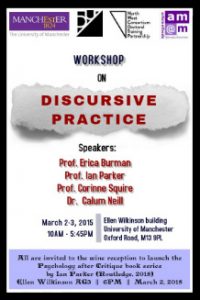 When the workshop on discourse analysis was over, we were all exhausted, but really wanted more. During two intense days we managed to cover and organise theoretical thoughts on discourse, and a little bit about narrative. We also saw examples of how it’s done and had the opportunity to ask lots of questions. Most importantly, we had generous opportunities to practice discourse analysis on our own materials. The latter was truly an eye-opening experience, which all participants kept reiterating in amazement. I wholeheartedly and very warmly recommend any postgraduate who may be interested in similar issues to take part in one of the workshops ran by the Discourse Unit.
When the workshop on discourse analysis was over, we were all exhausted, but really wanted more. During two intense days we managed to cover and organise theoretical thoughts on discourse, and a little bit about narrative. We also saw examples of how it’s done and had the opportunity to ask lots of questions. Most importantly, we had generous opportunities to practice discourse analysis on our own materials. The latter was truly an eye-opening experience, which all participants kept reiterating in amazement. I wholeheartedly and very warmly recommend any postgraduate who may be interested in similar issues to take part in one of the workshops ran by the Discourse Unit.
To give a summary of my own experience, I will divide my impressions of the workshop into five points.
To begin with, the workshop was preceded with a reading list with PDFs, circulated two weeks in advance. This was a promising start, both to get us thinking about things before the event, and because I found several of the texts to be helpful and exciting. This was already encouraging, and I went along to the event with high expectations.
Secondly, the opening lecture by Professor Ian Parker (University of Leicester) provided a fabulous, well-constructed, and very accessible introduction for three approaches of discursive critique. This talk helped us to orientate ourselves and be more knowledgeable about certain theories, methods, terms, and arguments. Importantly it avoided the intimidating volume and complexity of these issues. Because we came from fairly different backgrounds and levels of familiarity with these problems, this opening lecture was especially good at providing a toolbox of terms and concepts for us to utilise. Just as in his written texts, Prof Parker was accessible, organised and accurate, and nothing was left unclear or unanswered. It was terrifically relevant to people from all areas of social science and humanities.
Thirdly, there was a lecture by Prof Erica Burman (University of Manchester). Here we got a demonstration on what semiotic and ideological applications of discourse analyses can do to extract layers of meaning from one allegedly-thin and short overhead-banner in an underground train carriage. Just a few words and one partial image packed tropes of explicit and implicit sexism and misogeny, militarism, nationalism, violence, capitalism, and so on. Looking at everything from choice of fonts and colours, to words and images, we saw how the unsaid is present, how intertextuality works, and what assumptions and prior knowledge one has to have in order to be able to understand the message(s) being presented by the author. The sharp uncompromising distinctions inspired us to think about the volume of possible meaning waiting for us to identify and critically break down in our own material.
Fourthly, there were a number of guest lectures which gave the opportunity to discuss more specific directions and issues. These were given by Prof. Corinne Squire (University of East London), Dr.Calum Neill (Napier University), Dr Anat Greenstein (University of Manchester) and Sabah Sidiqqui (University of Manchester).
Finally, the most important element of the workshop! We were given individual extended space to practice (mainly semiotic) discourse analysis, using the close readings of other participants in our material. The technique was to take one short piece of source material from each participant, and then let groups discuss and analyse possible meanings and associations, while the person who presented the material did not comment until we finish the exercise. This was a truly eye-opening experience. The different interpretations were incredibly useful to everybody and were also a lesson in themselves, both because they highlighted the extent of analysis one can extract from a single example, but also how group dynamics and different readings can affect associations and reach new horizons of further analyses. Having a multi-cultural, multi-lingual and highly critical group added to its value, as we could rely on others to translate between disciplines, languages and cultures, thus adding even more interpretations and epistemic possibilities.
So, if you ever have the fortunate opportunity to take part in one of these events – don’t hesitate!
